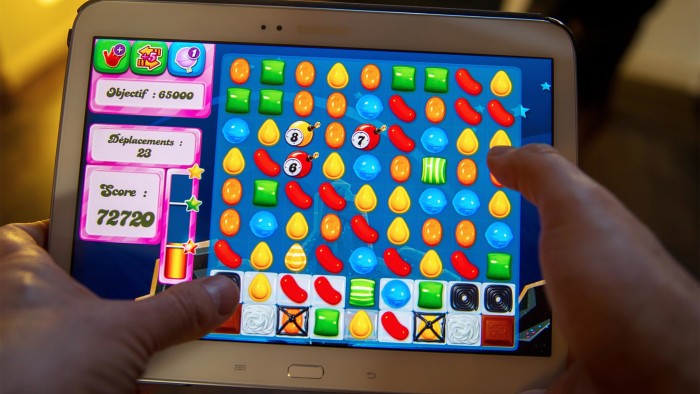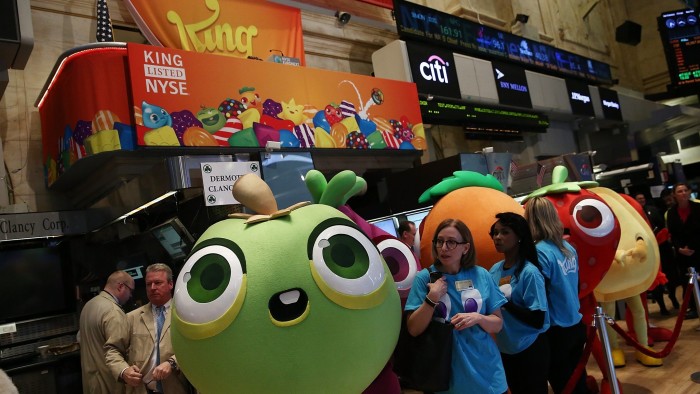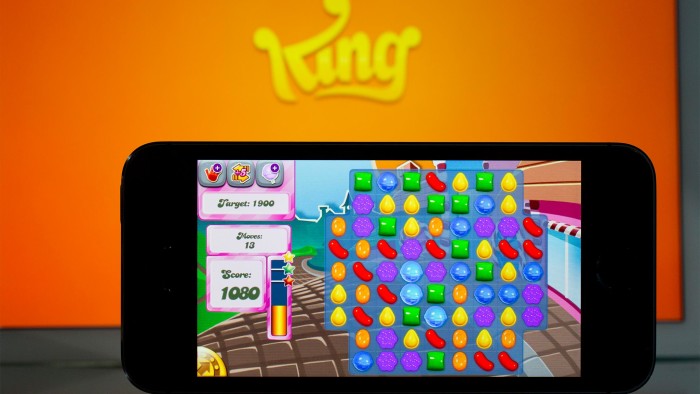‘Candy Crush’ owner King sold to Activision Blizzard for $5.9bn

Roula Khalaf, Editor of the FT, selects her favourite stories in this weekly newsletter.
Activision Blizzard is to pay $5.9bn to acquire King Digital Entertainment, the London-based group behind the hugely popular Candy Crush Saga mobile games, in the gaming industry’s biggest deal since Microsoft bought Minecraft last year.
Activision’s shares initially opened lower on Tuesday morning after the deal was announced as some analysts questioned the logic of a deal with King, whose main asset, Candy Crush, has been in decline for the last few quarters.
But the stock later rallied and was 3.6 per cent higher by close of trading in New York, taking the California-based company to a new all-time high of $35.82.
Lex
King is cash

Shelling out $5.9bn for the game-maker could prove cheap and strategic
Read more
King’s stock rose 14.8 per cent to just below Activision’s $18 a share offer as investors resigned themselves to accepting a bid that is 20 per cent below the price at which the company went public last year.
Beloved by commuters around the world, Candy Crush has enjoyed unparalleled popularity but despite the subsequent success of its Bubble Witch and Farm Heroes franchises, King is still looking for a new hit to make up for the ageing puzzle game’s waning income.
At a time when Activision’s games such as Call of Duty for consoles, including Microsoft’s Xbox and Sony’s PlayStation, make up the majority of its revenues, the company is paying a huge sum for one of the largest communities of mobile gamers in the world.
The deal gives the combined group more than 500m monthly active users across almost 200 countries and is expected to boost Activision’s adjusted earnings by about 30 per cent next year.
“Other than YouTube or Facebook there isn’t a worldwide network that has a bigger number of audience members,” said Bobby Kotick, Activision’s chief executive. “A big part of the opportunity is to explore the intellectual property that exists at Activision Blizzard and see if it makes sense in that network."
Analysts at Mizuho Securities wrote in a note on Tuesday that they were “surprised” and “somewhat cautious” about the deal given Activision’s aversion to mobile and social gaming in recent years.
King’s audience of casual players is “outside of the company’s typical wheelhouse of games that cater to hard-and-mid-core gamers”, and its “unpredictable” free-to-play model introduces greater risk to Activision’s broader business, the analysts wrote.
The all-cash transaction represents a 25 per cent premium to King’s valuation at Monday’s close, but the $18 a share price is below the $22.50 level at which King went public on the New York Stock Exchange last year.
Activision will fund the deal with $3.6bn in cash held outside the US, consuming almost all of its offshore funds, and the remainder via debt.
The acquisition, expected to close by early 2016, is conditional on approval of 75 per cent of votes to be cast by King investors at a meeting in Ireland, its corporate headquarters. The boards of both companies and a majority of King’s shareholders have already approved the deal.
Riccardo Zacconi, King’s chief executive, along with chief creative officer Sebastian Knutsson and chief operating officer Stephane Kurgan, will stay on after signing “long-term” employment contracts.
Last year, Microsoft used a portion of its offshore cash pile to pay $2.5bn for another European games company, Mojang, maker of the popular world-building game Minecraft, but was unable to retain the Swedish start-up's founders.
King and Activision’s management first met three years ago but talks began in earnest in April, as King’s shares traded roughly 25 per cent below their IPO price.
Podcast
Activision buys ‘Candy Crush’ owner for $5.9bn

US group Activision Blizzard is paying $5.9bn for the creator of Candy Crush Saga, in the gaming industry’s biggest deal since Microsoft bought Minecraft last year. Robert Cookson talks to Tim Bradshaw, the FT’s technology correspondent in San Francisco, about the deal.
“I think this is a deal which makes sense for investors and it makes sense from a strategic point of view for the business,” said Mr Zacconi.
King was founded in Sweden in 2003 and has created more than 200 games from offices straddling London, Dublin and New York.
Candy Crush, which was first launched on Facebook and smartphones in 2012, still accounts for more than a third of the company’s revenues. Overall consumer spending on King’s titles fell 13 per cent year on year in the second quarter.
For Activision, the acquisition promises to be the most transformative since its $18.9bn combination in 2008 with Blizzard, the World of Warcraft maker then owned by Vivendi Games.
‘Candy Crush’ maker gives Activision a route to mobile gaming

Acquisition of King Digital for $5.9bn is effort to get to grips with smartphones
Read more
Backed by an investor group that included Mr Kotick and Chinese internet group Tencent, Activision bought itself out of Vivendi, the French entertainment group, in an $8.2bn transaction in October 2013.
A handful of titles including Candy Crush, Supercell’s Clash of Clans, Machine Zone’s Game of War and Minecraft account for a disproportionately large amount of global consumer spending on smartphone games.
Even some pioneers of mobile gaming such as Rovio, maker of Angry Birds, have struggled to build a steady business in a hits-driven market where consumer tastes can be fickle.
For the UK’s tech industry, the deal is the biggest since Hewlett-Packard’s ill-fated acquisition of Autonomy in 2011. As the latest in a series of foreign takeovers, the King deal may reignite the debate over Europe’s ability to create long-lasting independent internet companies to rival those of Silicon Valley.
Comments